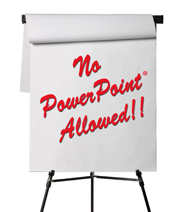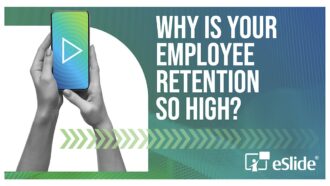No PowerPoint in Switzerland?
There is a new movement in Swiss politics, and it’s Anti-PowerPoint!
 Matthias Poehm, President of the Anti-PowerPoint Party of Switzerland is blaming PowerPoint presentations for a negative economic impact in 193 countries worldwide. Poehm calculates that 85% of employees and students who view presentations with PowerPoint feel that the slides are “killing motivation,” and the cost to the Swiss economy is 2.1 billion Swiss Francs (~$2.5B US) a year!
Matthias Poehm, President of the Anti-PowerPoint Party of Switzerland is blaming PowerPoint presentations for a negative economic impact in 193 countries worldwide. Poehm calculates that 85% of employees and students who view presentations with PowerPoint feel that the slides are “killing motivation,” and the cost to the Swiss economy is 2.1 billion Swiss Francs (~$2.5B US) a year!
A public speaking trainer by trade, Poehm believes that if his party becomes the fourth largest in Switzerland, he will gain enough press coverage to bring attention to his “international movement.” One of his stated goals is to launch a national referendum in Switzerland to create a law banning PowerPoint during presentations. However, he goes on to say that “The only aim of the referendum is to lift the PowerPoint issue both to the awareness of the Swiss people and to the awareness of the world population. We don’t want to prohibit anything to anybody – through this virtual claim we only want people to have a look at the existing solutions.”
Poehm proposes that viewing the live creation of flip charts is the solution to this corporate production killer, suggesting that it is more exciting and engaging for an audience to watch the speaker illustrate their points with pen and paper than to read pre-prepared slides. We respectfully suggest that if presenters have trouble using materials prepared BEFORE the meeting, forcing them to hand draw their ideas in real-time before their audience will only have a negative effect.
eSlide has seen many variations on this topic before. Modern media is filled with anti-PowerPoint and even anti-meeting messages. Most of these “anti” messages base their case on assumptions around productivity and effectiveness of meetings. Of course in today’s business environment most meetings include some form of electronic presentation, so slides take the blame for all. This message resonates, because everyone has attended a conference where the presenter reads a long string of bullet points and thought “I could have read this at my desk”.
Ultimately we find that the authors of these messages are reacting to LOW QUALITY presentations, content or just poor public speakers. Mr. Poehm is no different – if you review his website you find a series of “PowerPoint Horror Slides” which are perfect examples of low quality visual aids. These horror slides have obviously been created without the benefit of any guidelines for good slide design, and probably by people without any type of speaker training.
At eSlide, we disagree with this practice of blaming PowerPoint for low productivity and low motivation. Simply consider the impact of Al Gore’s presentation “An Inconvenient Truth”. By virtue of using well designed, effective slides Mr. Gore has reached and motivated over a billion people worldwide to take action around the issue of global warming. Or review the increase in stock price of Apple Inc. after Steve Jobs delivers a presentation. There are many more examples of the positive impact of GOOD presentations and effective presenters than there ever could be about the negatives of their low quality opposites.
In fact, we have seen how the process of developing a presentation actually improves the quality of the communication and the effectiveness of meetings in general. Mr. Poehm is overlooking the collaborative effort that typically goes into a PowerPoint presentation: weeks of preparation, refinement, group reviews and feedback from a leadership team. Often, consultants are brought in to assist in the enhancement of the visual aspects of the presentation. This process not only provides valuable review for accuracy and important opportunities to rehearse, but also several opportunities for feedback on the clarity of the message. Another key advantage of presentation software is the ability to reuse, update, publish and distribute the final product (Try that with a flip chart!) Ultimately, PowerPoint is just a tool that when used well, can be a powerful communication advantage to the user.
We do find ourselves in agreement with one of Mr. Poehm’s points: “Furthermore the APPP stands for introducing the subject presentation in schools as a compulsory subject from the first grade on”. We don’t know if the world should force first graders to tune up their slide skills, but eSlide feels that everyone who creates or delivers presentations should have the benefit of some training around how to maximize the effectiveness of their visuals.
This is why eSlide is extending the offer of FREE VISUAL DESIGN TRAINING to all members of the Anti PowerPoint Party (and anyone who wants to get more results from their PowerPoint). Sign up on our site at https://eslide.com/powerpoint-design-training/
We believe that rather than blaming the tool, presenters may be better served by bringing in professional slide designers to help bring Visual Value to the presentation. Well thought out and professionally designed slides are going to make communication of your concepts more effective, efficient and help you get the results you need.








